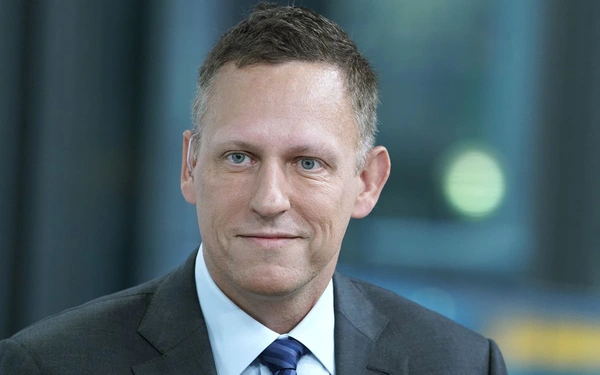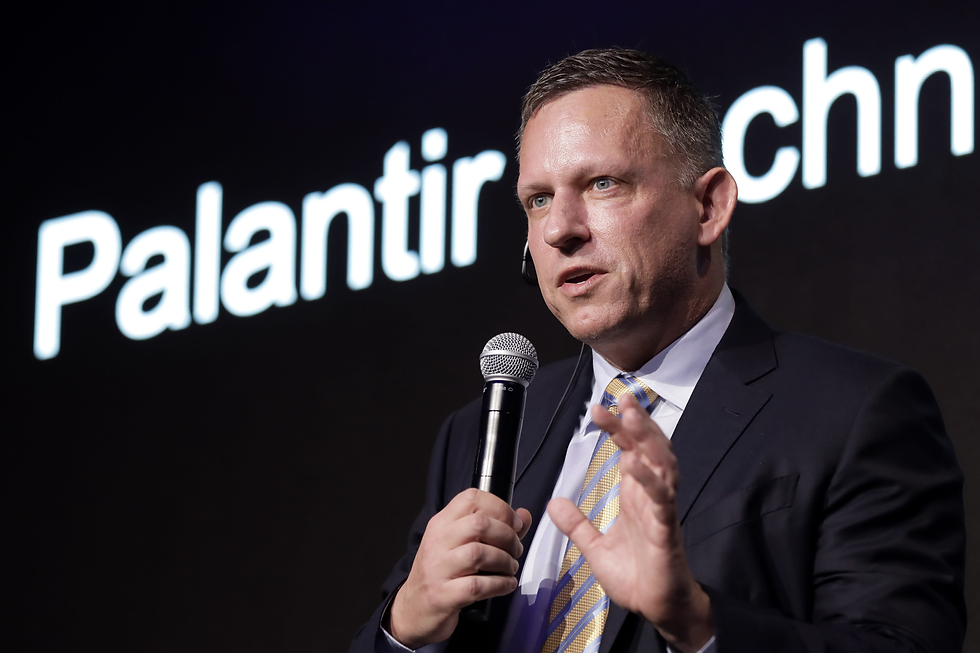Peter Thiel and America's Future: The Intersection of Technology and Politics
- Xuande

- Sep 17, 2023
- 7 min read

The term 'public intellectual' often evokes images of renowned figures like Noam Chomsky, James Baldwin, or Simone de Beauvoir. These individuals transcended their academic backgrounds to shape and challenge societal beliefs, using their knowledge and insights to influence public opinion on a grand scale. Throughout history, public intellectuals have played pivotal roles in socio-political movements, prodding societies towards introspection and change.
However, as our society evolves, particularly in this age of technological proliferation, the role of the public intellectual has undergone a transformation. In this digital era, where can we discover these contemporary thought leaders who bridge disciplinary divides, challenge established wisdom, and stimulate public discourse?
Enter Peter Thiel, a modern-day intellectual giant hailing from the tech hub of Silicon Valley. Beyond his well-known accomplishments as the co-founder of PayPal and an early investor in Facebook, Thiel's influence extends far beyond the realm of technological innovation. His book, "Zero to One," offers more than just a startup manual. It provides profound insights into Thiel's philosophical inclinations, emphasizing the imperative of groundbreaking, rather than incremental, innovations. His belief that monopolies, especially in the context of business uniqueness, propel genuine progress demonstrates his divergence from mainstream economic thought.
Furthermore, Thiel's political viewpoints, particularly his unexpected endorsement and support for Donald Trump during the 2016 elections, highlighted his willingness to challenge the prevailing liberal consensus in Silicon Valley. This endorsement went beyond mere political alignment; it served as a testament to Thiel's commitment to contrarian thinking, emphasizing the necessity of transcending popular narratives.
Thiel's critiques of higher education, his apprehensions regarding America's technological decline, and his observations on bureaucratic inefficiencies all reflect a thinker deeply engrossed in contemplating America's trajectory. When he underscores the glaring disparity between Silicon Valley's opulence and the broader stagnation faced by America, Thiel isn't solely making an economic observation; he's shedding light on a profound sociological divide.
Moreover, his personal identity as a gay Republican further underscores his ability to defy conventional categorization and stereotypes, making his voice even more distinctive in today's polarized sociopolitical landscape. In Thiel, we witness the embodiment of a modern public intellectual – an individual deeply rooted in the present yet profoundly concerned and contemplative about the broader canvas of society, the economy, and politics.
Now, having introduced Thiel and his role as a contemporary public intellectual, let's delve into his vision for America, the perspective from Silicon Valley, his concerns about the government's technological infrastructure, insights on foreign policy, thoughts on culture wars and identity politics, and his overall impact on contemporary discourse.
Thiel's Vision for America:
When we consider Peter Thiel, it's hard to forget that impactful speech where he delved into America's innovative spirit. He expressed something along the lines of, "All of America was high tech"[1]. This wasn't just a nostalgic glance back in time; Thiel's words carried a profound sense of lament. He mourned the loss of America's leadership in technological innovation. He transported us to the era of the Apollo missions, vividly illustrating a time when American ambition knew no bounds, and technological progress was not measured in small steps, but rather monumental leaps[1].
A Silicon Valley Perspective:
Now, when we think about Silicon Valley, it's often associated with an aura of perpetual success and groundbreaking innovation. However, Thiel, in his book "Zero to One," presented us with a more nuanced perspective. He articulated something like, “We aspired to have flying cars, but what we ended up with were 140-character tweets”[2]. This thought-provoking reflection prompts us to reconsider. It serves as a critique of the nature of innovations originating from Silicon Valley. Yes, there's an abundance of startups and tech giants achieving remarkable feats, but Thiel contends that much of this progress is iterative, building upon existing foundations. For Thiel, genuine progress isn't about making incremental improvements; it's about creating something entirely novel, making the leap from "zero to one"[2].
Government's Technological Decline:
Now, let's delve into a rather pressing concern that Peter Thiel has been vocal about - the state of technology within the United States government. It's no secret that Thiel has repeatedly pointed out the stark differences between the digital innovations flourishing in the private sector and the outdated technological systems within the government[3]. It's like having a sleek, high-speed sports car for personal use and a horse-drawn carriage for official matters. Highlighting these concerns, Thiel has mentioned something along the lines of, “We’re living in a world where the digital realm, you know, bits, are pretty much like the Wild West, while the physical realm, atoms, is tightly regulated”[3].
This technological disparity isn't just about inefficiencies in government operations. It has far-reaching consequences that ripple through various aspects of national life. From national security vulnerabilities to inefficient public services, and even its implications on America's global standing - the outdated state of governmental technology touches upon all these crucial aspects.

Foreign Policy and National Interests:
Thiel's scope of thought isn't limited to the realm of technology and entrepreneurship. He extends his critical gaze towards American foreign policy, particularly the nation's involvement in the Middle East[4]. Thiel has questioned whether the U.S. might be overstretching its resources and focus in international affairs, especially in such a volatile region.
His viewpoint suggests a need for recalibration, a shift in perspective where the country refocuses its efforts inwardly, prioritizing its domestic interests and rejuvenation[4]. In an intricate global landscape filled with challenges and opportunities, Thiel's perspective offers an alternative lens through which we can reevaluate America's role in the world.
Culture Wars and Identity Politics:
In a world where personal identity and broader political narratives intersect, Peter Thiel provides a unique perspective. In a candid interview, he expressed something along these lines: "I take pride in being gay, and I take pride in being affiliated with the Republican Party"[5]. This statement, made during a political convention, goes beyond a simple declaration of personal identity. Thiel's words challenged the binary, either-or perspectives that often dominate political discussions. He urged for a more nuanced understanding, one that transcends fixed stereotypes and entrenched positions[5].
In essence, Thiel's multifaceted viewpoints extend beyond the boundaries of typical political discourse, offering valuable insights into the intricate interplay between technology, governance, foreign policy, and culture.
Thiel as a Public Intellectual:
Peter Thiel's trajectory from a tech entrepreneur to a leading voice in societal debates underlines his emergence as a public intellectual. More than just opining on issues, Thiel shapes and directs discourses, offering often unconventional perspectives on technology, politics, and their interconnections[6]. Whether it's challenging the set trajectories of tech growth, questioning political alignments, or probing deeper into societal norms, Thiel's contributions as a public intellectual have been significant and thought-provoking[6].
Counterarguments and Broader Context:
It's important to note that Peter Thiel's support for Donald Trump, especially within the predominantly liberal landscape of Silicon Valley, has generated significant debate and skepticism[7]. Many have questioned the seeming incongruities of such an endorsement, particularly in the context of the broader ethos of the tech industry.

In discussions with Peter Robinson, Thiel's positions have been closely examined. His often contrarian viewpoints do more than just provide talking points for debate. They serve as catalysts that challenge established narratives, prompting individuals to engage in deeper introspection. This is what makes Thiel a continually compelling figure in public discourses. His presence in the public sphere acts as a sort of intellectual lightning rod, drawing attention to critical issues and encouraging dialogue.
Tying it to Current Trends:
In a world that is rapidly evolving due to technological advancements, Peter Thiel's perspectives act as a mirror reflecting both the achievements and the disparities inherent in the current system. It's worth noting that beyond the gleaming tech hubs, there exists a growing sentiment, particularly outside these epicenters of innovation, that the benefits of the technological revolution have not been evenly distributed.
Thiel's commentaries and critiques serve as a poignant reminder of this dichotomy. They emphasize the need for innovations that are not only groundbreaking but also holistic and inclusive. Thiel's perspective underscores the importance of technology benefiting society at large, rather than contributing to further divisions and inequalities.
Conclusion and Call to Action:
Peter Thiel stands at the crossroads of politics and technology, embodying the interplay between these two formidable forces in contemporary America. His perspectives, often considered unconventional, provide a unique lens into the changing dynamics of a nation that has been at the forefront of technological advancement. But as Thiel has often highlighted, technological prowess is not an end in itself. It's a tool, a means to achieve larger societal goals.
The increasing influence of tech leaders like Thiel on national narratives is not just an isolated phenomenon. It’s a manifestation of the broader convergence between technology and societal governance. This emerging synergy poses pivotal questions: How should we navigate the space where technology influences policy, and vice versa? Are our tech leaders equipped to shape political dialogues, given the profound implications of their platforms on public discourse?
In an era where our lives are inextricably linked to the digital realm, there is an urgent need for society to engage in deeper, more nuanced discussions about the roles and responsibilities of these tech magnates. Their platforms and innovations, after all, don’t just offer new gadgets or services; they reshape our societal fabric, influence our perceptions, and, in many ways, redefine our collective future.
The challenges of today’s interconnected world cannot be met with isolated dialogues. A holistic conversation, one that bridges the sometimes cavernous divide between the bustling corridors of Silicon Valley and the diverse streets of Main Street, is imperative. Only by understanding and reconciling the myriad perspectives can America chart a path forward that not only leverages its technological strengths but also remains true to its foundational ideals of democracy, inclusivity, and shared progress.
It's time for not just leaders like Thiel but for every American to partake in this dialogue, ensuring that the future we shape is reflective of our collective aspirations and not just the visions of a few.
References
[1] Peter Thiel, remarks at the National Press Club, 2016.
[2] Thiel's speech, Republican National Convention, 2016.
[3] Interview with Peter Thiel, Hoover Institution, 2018.
[4] "Zero to One" by Peter Thiel.
[5] Peter Thiel, remarks at the Republican National Convention, 2016.
[6] Thiel's endorsement speech, Republican Convention, 2016.



Comments